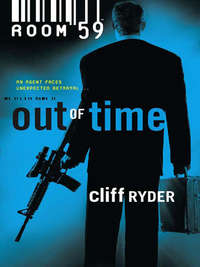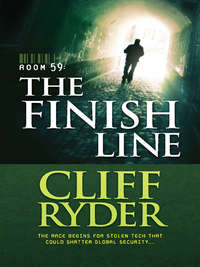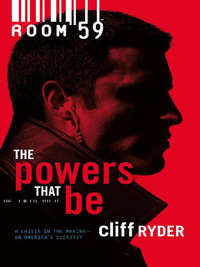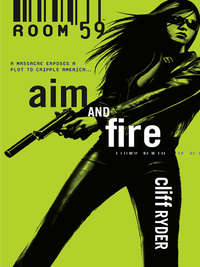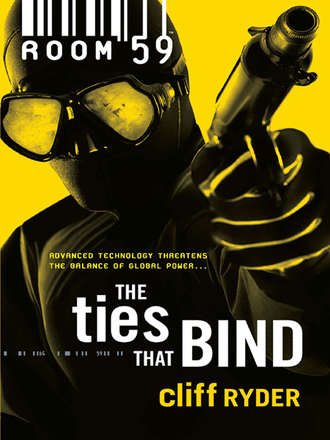
Полная версия
The Ties That Bind
“You fucker,” the kid said. “You shot us both. You killed Grinch and my legs are all messed up. I’ll never walk again. You said you’d kill me.”
“I lied about that, too,” Jason said. “Besides, walking is a privilege, you know. By the time you get out of prison, who knows what kind of shape you’ll be in.”
“Prison?” the kid said.
Jason stood up quickly, then turned to Miller. “You carry the Glock 17 model?” he asked.
“Sure,” he said. “Why?”
“Get me one,” Jason said. “With a loaded clip. Be quick.”
Miller was moving on automatic pilot, but he did as Jason told him. Jason took the weapon and jogged back to the range door, firing the weapon three times. Then he brought it back to the shop owner.
“Take this,” he said, handing it to him. He glanced around. “Do you have video surveillance of any kind here?”
The man shook his head, still stunned. “No,” he said. “Never figured on anyone trying to rob me.”
“I don’t suppose,” Jason said. “Listen, Jim, I’ve got to get out of here and fast. As soon as I’m out the door, you call the cops and tell them what happened…but leave me out of it. Don’t mention my name or my involvement.” He leaned forward, his eyes boring into the other man. “I was never here. They came in, tried to rob you and you defended yourself, got it?”
“I…I got it,” he whispered, looking at the carnage. “Who…who are you?”
“I’m nobody,” Jason said. “I’m a ghost.”
“A ghost,” Miller said. “You’re pretty good in a fight for a ghost.”
Jason laughed quietly. “That wasn’t a fight,” he said. “That was just practice.”
“Jesus,” Miller said again. Then he added, “The boy will talk.”
“Probably,” Jason said. “But he’s loaded on drugs—crack or meth probably—and they’ll never believe him. Just stick to your story and give them the Glock, okay?”
“Yeah,” he said. “Okay.”
Jason turned and moved for the door.
“Hey!” Miller called.
Jason stopped but didn’t turn around.
“Thank you,” he said. “Thanks for saving my life.” He sighed. “They got my son hooked on meth and it killed him. I couldn’t get him to stop, couldn’t save him no matter how hard I tried.”
“That happens sometimes,” Jason said. “You can’t save everyone.”
“Well, you saved me, so thank you. My son is dead, but I still…I want to live.”
“You’re welcome,” Jason said as he stepped out into the night.
The parking lot had only a few vehicles left in it and was poorly lit, but Jason found his own brown Volvo without any problems. He moved quickly, knowing the police could arrive any moment. He hit the remote unlock button on his key tab before he got to the car, skipping his usual quick walk around to ensure that no one had managed to get inside. It was always unlikely, but he never took chances with his safety. Now was the time to get moving.
He lived an orderly kind of life. His car was the safest one on the market—even safer after he’d added some additional aftermarket accessories. His apartment was sparsely furnished, meticulously neat and held no real clues as to who he was or what he did for a living.
He climbed into the Volvo, started the engine and headed for his apartment. In the distance, he could hear the telltale sound of police sirens. Clean action had felt good, despite breaking an operative rule. Of late, he’d felt strangely conflicted. When he’d worked for the CIA, he had very little downtime. Room 59 operatives had mandated time off between missions. He’d been surprised by the intensity of the training period, including his first posttraining assignment—a final exam, of sorts—that involved him assassinating a target. It had been a simple assignment, really. More the kind of thing assigned to a rookie than an old hand like himself.
In the darkness of the car, Jason laughed to himself. Home was just a place to sleep between jobs. He wondered if any agents had a wife and kids in this line of work. He shook his head. It didn’t make sense to have a family. Not for people like him.
And yet…family was on his mind more and more lately. Despite his son’s death, Jim Miller had wanted to live. He probably had a wife, maybe other kids—people he counted on and who counted on him. When he’d left the orphanage, Jason had no idea who his real family was or even if they were alive. All he had was his last name, which was on his birth certificate. He’d tried to find out more a couple of times, but other than learning that his mother had been an Inuit from somewhere in Alaska and his father was unknown, there’d been precious little information. After a time, he’d given up on the idea and, considering his profession, it was probably the wisest course of action. Being responsible for his own life, taking his own risks was one thing, but adding a wife or a child or some other family member to the mix, putting them at risk, seemed the very height of irresponsibility.
Still, he was alone and, he admitted to himself, lonely. It would be good to have someone he could count on. Someone to come home to.
He turned the corner close to his apartment complex and pulled into the parking lot. He shut down the Volvo, locked it and headed inside. He’d grab a quick bite to eat and then rack out for the night. His mandatory downtime was over, and he expected that an assignment would be heading his way soon enough.
Once he was inside, his thoughts turned again to the idea of trying to find his mother, his family. Why had she left him at the orphanage in Seattle? Why didn’t she want him? Did he have other family members—a brother, a sister, someone? The questions plagued him even as he heated a bowl of soup and cut a few slices of bread.
He knew he couldn’t live the life he did forever. Sooner or later, he’d get older, slip up and get killed or have to find something he could do that didn’t involve fieldwork. Would he be able to have a family then, or would it just be more of the same? What kind of woman would ask about his day and accept the only answer he could give—“I can’t tell you or I’d have to kill you.”
Sitting at the kitchen table, Jason pondered the questions and wondered why they were coming up again now, so soon after starting a new job, but his mind didn’t have very long to linger on them. Halfway through his soup, the pager on his belt began to vibrate.
He pulled it free and looked at the display.
His first assignment, Jason realized, was right on time to distract him from these notions.
2
The next morning found Jason up before his alarm clock sounded. It was a few minutes before six. He went through his usual routine—a five-mile run, a quick shower, a breakfast of oatmeal and eggs, with grapefruit juice and a cup of coffee.
He took the time to scan the morning paper and found a short note in the local section on page six about the robbery. Miller had stuck to the story Jason had given him, and the police were calling him a “tough citizen” and a “hero.” The man he’d killed was wanted for two other robberies and a suspected homicide. Good riddance, Jason thought.
When it was about time for him to go to work, he sat at the small computer console in his apartment and booted up the system. In all his years as a CIA operative, he had worked with a lot of gadgets and toys, but when compared to the Room 59 equipment, it was apples and oranges. They were years, perhaps decades ahead of what other agencies were utilizing in the often silent war to keep America safe. The virtual conference room used by field agents was just one of the more unique tools in the Room 59 arsenal.
Once the computer was booted up, Jason slipped on a pair of glasses that projected the virtual world onto the lenses. He clicked on the launch icon. This was the first of several layers of security he would have to pass through in order to report in. The icon opened a window that appeared on the lenses rather than the screen itself. All that was visible was a large text block requesting his password.
Jason typed it in, and the launch console flickered once, then vanished and was replaced by what appeared to be a long hallway. The walls glowed a faint green color and reminded him slightly of the look of the old Tron video game. This, of course, was much better. He was now simultaneously sitting at his desk and walking down the hallway. His avatar, which he’d designed himself, appeared much like he himself did. A six-foot-two-inch-tall man with broad shoulders and a narrow waist. His black hair was cut short and neat, and his eyes were a cold, faded blue. He preferred to dress in a sport coat and dress shirt, with pressed slacks and polished shoes. Jason believed that looking professional was the first step to being professional, so he dressed the part every working day. He knew he was considered handsome by most of society’s standards, and had no problem finding female companionship when it suited him. He enjoyed the sex, but that was all it ever was.
Love, he knew, was out of the question. Just like family.
He knew that some people created fanciful avatars or added personal touches like wings, but for himself, he saw no reason to change who he was or how he looked. The people who ran Room 59 knew what he looked like, and it was highly unlikely that anyone he might encounter in the virtual world would care how he appeared, let alone actually see him in real life. Part of the job was not interacting with other operatives unless a mission specifically called for it.
At the end of the hallway he came to a simple door and next to it, a hand and retinal scanner. As he approached the door, he stopped.
A female voice said, “Place your right palm and eye in front of the scanner for identity confirmation.”
Jason raised his glasses and held his hand up to the scanner that appeared on his computer screen.
The voice said, “Please hold still while the scan is in progress.” A brief light flashed over both his palm and his eye. The voice said, “Scanning.” Then it continued, “Identity confirmed. One-hundred-percent match to existing record for Siku, Jason, field agent. Voice confirm?”
“Siku, Jason,” he dutifully said as he adjusted his glasses. “Reporting for virtual conference scheduled for 0800 hours.”
“Voice confirmed,” it said. “Have a nice day.”
In front of him, the door unlocked and Jason opened it, stepping into an office building that extended as far as the eye could see. He’d been told that some of the security protocols were new, but he had to admit that any system that could scan his palm, voice and retinal prints from a distance was pretty impressive. He’d also been told that anything less than a one-hundred-percent match would result in bad things. What those bad things might be, no one seemed to know.
The conference room was down a row of cubicles and to his left, and he moved there, not bothering to greet the other avatars working around him. He stepped into the conference room, and saw that his boss, Denny Talbot, was already seated at one end of the table, talking to someone on the floating screen in front of him. Denny waved him in, and Jason stepped inside, shutting the door behind him.
“He’s here now,” his boss was saying. “I’ll get back in touch right after we’re done here.” Denny looked up from the monitor, then stood and offered his hand. “Good to see you again, Jason. How was the downtime?”
Jason shook the offered hand. “Boring,” he said. “I really don’t need that much of a break between jobs.”
“You’re not the first agent to tell us that,” Denny admitted. “But everything we’ve learned so far suggests that a successful agent is one who does take a break once in a while.” He gestured toward the chairs. “Have a seat.”
Jason sat down, marveling again at how real this virtual world seemed. It was computer programming on a level the rest of the world only imagined in science-fiction books and movies. “Do you have an assignment for me?” he asked, stretching his legs beneath the table. “I’m ready to get to work.”
Denny picked up a file from a small table behind him. “Indeed,” he said, sliding it over. “Straight recon, nothing fancy. Get in, confirm the information, get out and bring it back.”
Jason opened the file folder and quickly reviewed the contents, committing them to memory as he read. “Supercavitation?” he asked. “No one has that kind of technology yet.”
“Not that we know of,” Denny said. “But we’ve reviewed the source carefully, and at the least, he believes it’s the truth.”
“So, you want me to find this sub—if it exists—and bring back as much data on it as possible?” Jason asked.
Denny nodded. “The plans, if at all possible. Our source believes that there are forces in Russia who want to bring the Cold War, the arms race, the whole shebang, back into full swing.”
Jason considered it, then nodded. “I wouldn’t be surprised,” he said. “In fact, it wouldn’t even be the first time I’ve heard the sentiment. A lot of people miss Mother Russia, despite her less-than-charitable ways.”
“I suppose so,” Denny said. “But we can’t afford another war—cold, hot or anything in between. If the Russians have developed this sub, we need to find it, get the plans and immediately make it known that we can build them, too. Hopefully, they’ll realize how closely we’re watching them and focus their efforts elsewhere like food for their people.”
“Why me?” Jason asked. “I’m not usually a straight reconnaissance man.”
“According to our intel, they’re testing the sub in the Bering Sea. We want you to use the local Inuit villages along the coast up there for cover. You also speak fluent Russian, which makes sending you an even better fit.”
Jason glanced through the folder one more time, memorizing the information and calculating what he’d need to accomplish it. “Mission support?” he asked.
“We’ll put together an offshore support team by the time you’re in place, situate them on an oil barge. Just set up a coordinates beacon somewhere out of the way and within twelve hours, you’ll be good to go.” Denny tapped an icon and the image of a very attractive woman appeared. “This is Tina Kanut. She’s native, knows the area and works for a guide agency up there. We’ve already arranged for her services.”
“Sounds fine,” Jason said. “Any other parameters I should know of?”
Denny shook his head. “Nothing critical. Just remember that this is a recon mission, so I’d rather not have a trail of bodies. Get in, get the data and get out. Clean and simple.”
“Understood,” Jason said. “And if something goes wrong?”
“If you can and there’s time, check in with me and we’ll decide how to proceed. If not, destroy the sub. That will send a message, too,” Denny said.
“Got it,” Jason said. “When do I leave?”
“We’ve got you scheduled on a flight from Minneapolis to Seattle, connecting to Anchorage, tonight,” he said. “Your cover documents are being delivered this morning. You’ll be going in as an advance man for a geographic-survey team. That should give you a solid reason to be in the villages and along the coast, too.”
“That works for me,” Jason said. He slid the folder back to Denny and got to his feet. “I’ll report in as soon as I’ve got something solid.”
“Just remember that that part of the world is a strange place,” his boss replied. “The Russians watch the Bering Sea very carefully and they’re always listening, and the Inuit are a people trapped between the need to adapt to the modern world and the desire to cling to their traditions. That’s another good reason to send you, Jason. You have a better chance of understanding them, I think, than any of our other agents, and if they can be a help to you, that’s a good thing, too.”
Jason chuckled dryly. “My mother was Inuit, so I have the blood,” he said, “but I’m hardly one of them. I don’t believe in family.”
“I know,” Denny said. “It’s one of the reasons we recruited you. Family men get tangled up in personal issues. That doesn’t seem to be a problem you have. Still, that doesn’t mean you can’t use the native people up there if it comes to that.”
“I don’t imagine it will,” Jason replied. “But I’m not above using them to get the job done.”
Denny thought about it for a minute, then said, “I know that, too, Jason. I’ve read your file several times over. You’re smart, educated, cold and decisive. It’s why you’ve been so successful and why I think you’ll be successful here. That said, beneath the exterior, I imagine that you’re as human as the next man. Try not to let the machine take over completely, okay? The best field agents tend to blend your strengths with the ability to be compassionate.”
“I’m not a machine,” Jason objected, stung a little. “I just don’t have much use for other people. They’re a burden I don’t care to deal with.”
“You mean like what happened at the firing range last night?” Denny asked. “You killed one man and injured another.”
Jason paused, stunned that his boss knew what happened. “How did you—”
“It’s my job to know,” Denny said. “And for what it’s worth, you did the right thing. We ask our operatives to be ghosts, but there’s also a time for doing what’s right. That was the choice you faced last night, and you made the right call.”
“It won’t happen again,” Jason said, still trying to wrap his mind around an organization that could know so much about one person so quickly. “I mean…you hired me to be a ghost, so that’s what I’ll be.”
Denny chuckled. “Sooner or later, you’ll do the human thing again. I understand why you feel the way you do, why you operate the way you do. Just remember that relaxing once in a while won’t hurt you, okay? You are human, after all.” He smiled.
“Got it,” Jason said. He turned to the door. “I better get a move on if I’m going to be ready to catch that flight.”
“Stay safe,” Denny said. “And think about what I said, Jason. No man can stand alone forever.”
Without looking back, Jason said, “I’ll give it some thought, boss.” Then he opened the door and slipped out of the room.
All the way back to the log-out screen, he thought about Denny’s words. What did they want from him? One minute, he’s supposed to be a cold-blooded killer, the next he’s supposed to…what? Be a kinder, gentler assassin?
He logged out and put the glasses on the desk, rubbing his eyes to ease the strain. It was ridiculous, he thought. He didn’t have time for friends and family. And he didn’t have time to deal with any of the feelings associated with those issues today. He had saved Miller because it was the right thing to do, not because of some human bond. Most of the time, there was right and wrong, good and evil. Shades of gray entered into it, but usually that was confined to situations where feelings were involved, where the moralities of a given situation were debatable. He didn’t deal too often in those gray areas. His life tended to be black and white and he preferred it that way.
He got up from the desk just as a brown envelope slid beneath his front door. He knew it would contain his travel documents. “I’ve got work to do,” he muttered to himself as he crossed the room. “I’ll deal with learning how to be a more compassionate assassin tomorrow.”
“YOU’RE CERTAIN of this, Denny?” Kate asked, running a hand through her short-cropped hair. “He’s brand-new and this is delicate. We can’t afford any mistakes at all.”
“I’m sure, Kate,” Denny replied. “You’ve read his file.”
“I know, I know,” she said. “Ph.D. in psychology from Harvard, with a genius-level IQ. Borderline photographic memory. Well above average blending skills and he excelled in our training program. His final test was a masterwork. That dignitary was about as covered as anyone I’ve ever seen and Siku got him. My concern is that this could get personal for him. His family is out there…somewhere. We don’t need personal right now.”
“Sure, it is,” Denny said. “But the man obviously does not care. He’s ice, Kate, and his record is spotless. My contact at the CIA said that they called him the thinking man’s assassin. Do you know why?”
She shook her head, and he continued. “Because he was like a computer. Precise, calculating, no feelings at all. He plans and plans and then does the job. No mistakes. And he’s not above using people to meet his mission goals—even if it gets them killed.”
“I understand all that, but this isn’t an assassination,” Kate said. “With any luck at all, no one important will even know he was there.”
Denny sighed heavily and wished he could go back to his horse ranch. “Kate, with all due respect, I think you’ve missed something here.”
One eyebrow arched and her lips pursed tightly before she said, “Go on.”
“The odds of him finding the sub—if it exists at all—then getting to it, getting on board and getting out again with no one the wiser are about a million to one against. Submarines are very confined spaces, and a stranger is going to be recognized instantly. It’s far more likely that he’ll be captured.”
“So why send him?” Kate asked. “If he’s just going to be captured and die, what’s the point?”
“I didn’t say he’d die, Kate,” Denny said. “I said it was far more likely that he’d be captured.”
“What’s the difference?”
“If he does get captured, Kate, it won’t be for long. Certainly not long enough for them to get him back to Russia. The most likely scenario at that point is that he would find a way to destroy the sub and kill the crew, even if it meant his own death.”
“How did you reach that conclusion?” she asked. “His psych profile doesn’t indicate anything like suicidal tendencies.”
Denny shrugged. “He’s not suicidal. What he is, Kate, is a man without anything in his life but the mission. That can be a good thing for us, of course, because if he’s successful, we win, and if he fails, it’s likely that we at least gain some time. Not as big a win, but a win of sorts. It’s not a very good thing for him to be that way, but he hasn’t figured that out yet. He may live long enough to do so, but I can’t really say for sure at this point.”
“You’re a coldhearted man, Denny,” Kate said. “Very cold.”
“No, Kate,” he said, “I’m a realist. I can’t afford to be anything else. If I start thinking like an optimist, a lot of people are going to die. Our agents need to be human, too. So do we, for that matter.”
“There’s a difference between being a hopeless optimist and having hope,” she said, her voice soft. “I’d like to believe that a big part of what Room 59 does is finding that difference.”
“Maybe it is,” Denny said. “But in the meantime, we have a job to do, and sometimes that means that we have to use people in some not so nice ways, even our own agents. Especially when it means, they’re better agents for it in the long run.”
“We all get used,” Kate said. “That comes with the territory. But that doesn’t mean we always have to do the same to our own people.”
“Kate,” Denny said, “unless I miss my guess, by the time he lands in Anchorage, Jason will have already figured out that he may have to die in order to achieve some level of success on this mission. As you said, he’s not stupid.”
“And when he realizes that you’ve sent him on what could be nothing more than a quick trip to die?” she asked.
“He’ll be cranky,” Denny said, smiling. “But he’ll also have to decide if there’s anything more important in his life than the mission—even something as petty as getting even with me. He’ll either die or come back a better agent for the experience. He might even come back with some actual feelings.”
“Sounds like you’ve got it all worked out,” she said. “But it still feels crappy.”
He nodded. “Yes, it does,” he said. “But with another Cold War brewing and more international terrorism going on than we can even begin to keep track of, we need better agents than we’ve ever had—men and women who can find the balance between hopeless optimism and hope, who can think on their feet and decide what is more important to them—their lives or the world. We need agents who can make that choice confidently, Kate.”
She thought for several long moments, then nodded. “You’re right,” she said. “The game is changing, I think, faster than many of us believed it would.”




